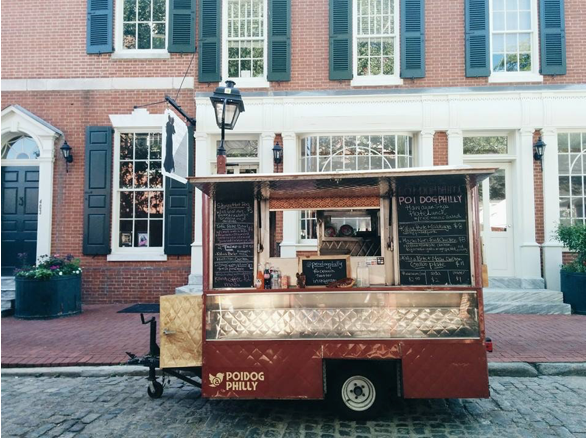Getting into the Philadelphia food truck scene does not have to be a daunting task. While you probably have a basic idea of how to set it up, there are still some things that need to be considered which you might not be aware of. That is why it is best to get advice from people who already got their feet wet. Fortunately, Mr. Michael Barlettano of Surf and Turf Truck was kind enough to share his experience operating a food truck business in Philadelphia. His business has been running for three years now and is doing very well. In addition, Ms. Kiki Aranita and Mr. Chris Vacca of Poi Dog Snack Shop also took the time to write back to us to tell their story. They’ve been successfully operating their food truck business in Philly for almost four years now, and they have much to tell about the biz.
FTE: Tell me a bit about yourself and business.
STT: My name is Michael Barlettano. I am from Nutley, NJ, but currently reside in Long Branch NJ. The Surf and Turf Truck has been operational for 3 years. It was started by Adam and Beata Browne and Cindy Matas. Cindy is my girlfriend, and we came on board as owners in August 2015. Prior to owning the Surf and Turf Truck, I was a successful trader at various investment banks in New York trading credit derivatives. I thought it was time for a change and have always had a passion for food, and thought this was the perfect place to start.
Adam and his wife Beata moved to Tampa, FL with the company’s other unit, so now we have two separate locations, with them managing Florida and Cindy and myself managing NJ and PA. Our truck is unique, as it is one of the few lobster trucks around, and one of the only “Surf and Turf” genre trucks we know of. We pride ourselves on clean and simple food that captures our yin-yang philosophy. Whether it is sweet and spicy, soft and crunchy, hot and cold, etc., we make food that challenges the senses and provides an overall delightful experience that you will come back for. Our menu focuses on four different types of lobster rolls, a bistro steak sandwich, salmon burger, shrimp taco, tofu rolls, a variety of fries and more. Check out http://www.surfandturftruck.com for more info.
We’ve been operating in Philadelphia for 3 years, but also have been traveling anywhere from Jersey City, NJ to York, PA.
PDSS: We are Kiki Aranita and Chris Vacca and we own Poi Dog Snack Shop. We’re going into our fourth year of operation in Philadelphia. Poi Dog means “mixed breed” or “mutt” in Hawaiian pidgin, so the basis of what we do is Hawaiian but we draw heavily upon the cultures that influenced the local food of Hawaii, with an emphasis on Filipino and Japanese cuisines.
FTE: How did you learn how to start a food truck in your area? Did you read a book, have a mentor etc. Tell us about those early days figuring it all out. Are there any resources you recommend for getting started or organizations that could help entrepreneurs get started in your area?
STT: Thankfully we had Adam and Beata to mentor us through this process. They built a great business from the ground up and we were lucky to step into a successful, branded business. However, there are great resources for people looking to start a truck. The web offers a variety of sites from current owners, including your own site which is a great resource. Also, the NJFTA and PMFA (NJ and Philadelphia food truck associations) are great resources for those looking to start a truck. Jon Hepner and Rob Mitchell are pioneers in the business and do a great job providing resources and advice to those looking to start a business.
PDSS: We helped get another food truck off the ground in Philly prior to starting our own and Chris also worked for Jose Garces’ taco truck, Guapos Tacos. We took business courses through the Small Business Development Center at Wharton and that was extremely useful to us.

FTE: One of the most common challenges beginning food truck owners have is navigating city regulations, including health and fire safety requirements. As you know, these regulations vary considerably from county to county and city to city. Where should entrepreneurs go to find information about the local health code and fire safety regulations?
STT: This is one of the biggest challenges we face. Every town, county, and state are different. Best way to do this is to do your homework. Check the government websites and don’t be afraid to call to find out exactly what you would need. The worst thing to happen is be unprepared and asked to leave an event and possibly face fines. The NJFTA and PMFA are both relentlessly trying to make licensing and permitting easier and more cost effective, and are always a good resource.
PDSS: The websites of health departments in any given county can be limited in usefulness. It’s best to corroborate information given on the website with speaking with a health inspector in the same department—we’ve found that the information doesn’t always match up. For instance, in some counties you’re allowed to vend for a certain number of days without being required to register for a license. For others, you need temporary event licenses in addition to your regular ones.
FTE: In other areas, available parking space has been a constant problem among food truck operators. How is it in Philadelphia?
STT: Philadelphia is the same. I think the biggest advancement you can make is relationships with people who are looking for food trucks and have appointed dates to park. Whether it’s a local business or a large office park, having set dates is a huge advantage.
PDSS: We haven’t vended on the street in the last two years. Special events, beer festivals, select vending dates in Center City and private/corporate catering all keep us pretty busy and are much more lucrative than spending all day on a street corner. There are portions of the city demarcated for trucks that do want to have regular locations, but for the most part, they require special permits, a significant sum of money and patience through bad weather.
FTE: What are some of the unique challenges of operating a food truck in your city?
STT: The winter is definitely one of them. Especially for a new truck without a big financial buffer, the winter months are tough. Demand for eating outside is limited, weather can keep you out of work for weeks, and trucks tend to breakdown more. Learning how to save during busier months, as well as strategically book your truck in the winter is probably the biggest challenge a trucker faces in the northeast.
Also, keeping it fresh is always a concern. The more and more you vend, and the bigger your support base is, the more you need to keep coming up with new menu items, while still keeping the essence of your cuisine.
PDSS: Weather and lack of foot traffic in a few areas that we vend at (these often go hand in hand). The health department has gotten a tiny bit better in the last few years, but many of the regulations when it comes to special events can be excessively bureaucratic. For instance, since we do so many special events during food truck season, some weeks we can be inspected by the same inspector every couple of days. And these inspectors often have their hands full inspecting forty or so trucks at a time because temporary special events require it. This often ends up creating a mess of inspections during a few busy hours of service, impatient customers and us being asked to recite lists of food borne illnesses and their symptoms as we are trying to cook and take orders. In contrast, restaurants typically get one inspection per year.
FTE: Finally, if you could give only one piece of advice for new food truck entrepreneurs. What would that nugget of advice be?
STT: To go for it. Trucking is hard, but it is great and rewarding. I love food, and while I’m working more than I ever have, I’m happier than I’ve ever been. But make sure you do your homework. Know all the financials, and know your own limits. When it’s busy, you can work as much or as little as you want, and I’ve seen people burn themselves out. Trucking isn’t just about the hours you spend serving customers. There’s countless hours of prep work, hours in the office planning a schedule, doing your books, and just trying to stay sane. So I would say know what you are getting into, but once you are comfortable with it, go for it with everything you have.
PDSS: There are too many food trucks operating in many cities, often with too similar menus. Many markets are saturated. Nobody needs another truck peddling grilled cheese or burgers. If you’re really keen on starting a food truck, make sure it is utterly unique and fulfills a need that no other business in your area does.
Thanks a lot Michael, Kiki and Chris!
Related Resources
Here is a list of resources that you may also check out. It is best to be completely informed first before taking that big leap. Good luck!
Philly Mobile Food Association – As Michael pointed out, this site is a great resource for anyone wanting to start a food truck business in Philadelphia.
Mobile Food Vending Unit-Plan Submission Guide – Here is a comprehensive guide from the Office of Food Protection in Philadelphia.
Business Services – City of Philadelphia – It is also a good idea to check this page out if you plan to do business in the city.
SurfandTurfTruck.com – Don’t forget to visit Michael’s Surf and Turf Truck website.
Poi Dog Snack Shop – To find out more about Poi Dog Philly, please visit their website.





